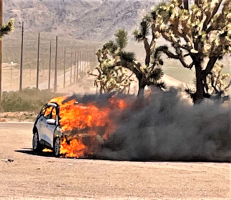
— A Ford hybrid engine recall has caused a class action lawsuit after the original lawsuit was dismissed based on a previous hybrid engine recall.
It may sound confusing but that's what happened.
The current Ford hybrid class action lawsuit includes these vehicles equipped with 2.5-liter hybrid electric vehicle (HEV) and 2.5-liter plug-in
hybrid electric vehicle (PHEV) engines.
- 2020-2023 Ford Escape Hybrid
- 2022-2023 Ford Maverick Hybrid
- 2021-2023 Lincoln Corsair Hybrid
In July 2022, Ford recalled about 100,000 hybrid vehicles, specifically 2020-2022 Ford Escape Hybrid, 2021-2022 Lincoln Corsair Hybrid and 2022 Ford Maverick Hybrid vehicles.
Ford told the U.S. government there had been at least 23 reports of thermal incidents worldwide, nine which involved fires.
"Of the 23 reports, Ford’s CCRG has categorized the warranty and field reports as: nine describing under hood or vehicle fire, six reporting localized under hood melting, seven describing under hood smoke, and one that did not contain sufficient detail to characterize. Ford is not aware of any reports of accident or injury related to this condition." — Ford recall documents
Ford alleges the engines can fail from machining problems, but the automaker said in 2022 the chance of an engine failure was rare based on failure rates of 0.17 repairs per 1,000 hybrid vehicles.
According to the hybrid engine recall, Ford dealers were told to drill drainage holes in the under-engine shields and to remove four blinds from the active grille shutters so more air could flow to reduce temperatures.
Ford reasoned by reducing the chance of an engine block breach, the odds of an engine fire would also be reduced because thermal incidents occured only on vehicles with blown hybrid engines.
Weeks after the Ford hybrid engine recall was announced, a Ford owner filed a nationwide class action lawsuit even though his vehicle didn't suffer any engine fire incidents.
The plaintiff's vehicle was repaired during the recall, but he said the repairs weren't good enough.
However, a federal judge dismissed the Ford class action by ruling Ford had offered to repair the hybrid vehicles for free before the lawsuit was filed, and everything would be monitored by federal safety regulators. In addition, Ford offered reimbursements to owners if necessary.
Another Ford Hybrid Engine Recall
However, Ford announced in June 2023 another recall of the same models for the same problems. The hybrid engine recall involves more than 125,000 model year 2020-2023 Ford Escape, 2022-2023 Ford Maverick and 2021-2023 Lincoln Corsair hybrids.
Ford learned of three hybrid engine compartment fires that occured on vehicles that had been repaired during the previous hybrid engine recall.
Ford told owners they could continue driving their hybrid vehicled unless symptoms appeared.
"You should safely park and shut off the engine as promptly as possible upon hearing unexpected engine noises, after experiencing a reduction in available engine power, or if smoke is observed emanating from the engine compartment." — Ford hybrid engine recall
Interim Ford hybrid engine recall letters were mailed June 23, 2023, telling customers that second letters will be mailed once replacement parts are available at dealers. Ford told customers parts would likely be available in October 2023.
This recall caused the same attorneys who filed the original Ford hybrid class action lawsuit to file another lawsuit, this time by six named plaintiffs.
The plaintiffs assert Ford has failed to properly repair the hybrid vehicles which leaves the vehicles in danger of fires.
The plaintiffs also contend Ford knows about the problems and how to fix them because in 2022, Ford recalled a small number of Escapes equipped with 2.5L engines.
The recall was announced because of improper "crankshaft machining surface, which led to the exact failure here, a 'block breach' caused by the connecting rods and bearings being expelled through the block and oil pan.'"
"For that recall, Ford instructed dealers to inspect the connecting rod bearings against a subjective instruction guide, and replace the engine if the defect is revealed. Ford could easily implement that same recall inspection and repair here, and it would reveal exactly which of the now over 125,000 vehicles has the faulty engine." — Ford hybrid engine lawsuit
The Ford hybrid engine class action lawsuit was filed in the U.S. District Court for the Eastern District of Michigan: Nishon, et al., v. Ford Motor Company.
The plaintiffs are represented by Hagens Berman Sobol Shapiro LLP, and The Miller Law Firm PC.




